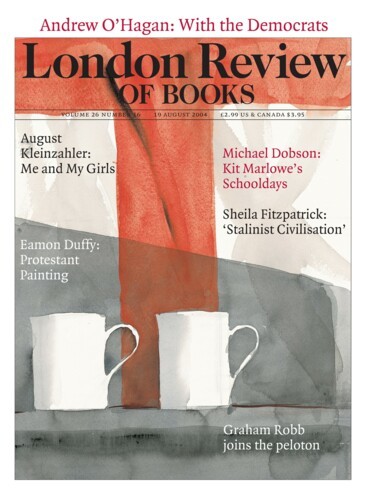‘Hanratty! The name which has haunted the British criminal justice system for a generation is about to hit the headlines again.’ Paul Foot wrote that in the LRB in December 1997. The terrible thing, for people who were the same age as Paul and knew him and liked him, is that he has died and Hanratty hasn’t been proved innocent. Yet.
Paul wrote sixty pieces for the LRB; the first, published pretty much exactly twenty years ago, was a review of Peter Taylor’s Smoke Ring: The Politics of Tobacco – ‘a marvellous book’. Later in the piece a ‘glorious leak’ undoes an attempt by the makers of Marlboro cigarettes to stop the world seeing film of the Marlboro cowboys dying of lung cancer. Marvellous, glorious, terrific, delightful: Paul enjoyed the books he wrote about. And when he didn’t like them he enjoyed that too. In 1996 he reviewed Andrew Neil’s memoir of his life and times as ‘a front-line journalist’ (‘front-line journalists usually have a high opinion of themselves but Neil’s self-regard is loud, unique, indestructible’):
Add to these anecdotes and quotations Neil’s writing style, which is dour and monotonous, that in all its 481 pages there is not the slightest trace of a joke or a sign that the greatest young journalist of his generation ever enjoyed a single book he didn’t serialise, and you might conclude that Full Disclosure should be consigned to everlasting fire. You would be quite wrong. The book is thoroughly absorbing. It is a dark tragedy, the chief fascination of which is that its author does not realise he is in a tragedy at all.
In 1999, at the time of the war in Kosovo, Paul was taken to hospital with what turned out to be an aortic aneurysm; he very nearly died, and after several weeks in a coma he was troubled by hallucinations. What brought him to his senses, he wrote in an LRB Diary the same year, was ‘that faithful old pick-me-up for sick socialists: indignation’. Indignation may be the thing he enjoyed most – in the short term (eloquently) and over the long haul (diligently). In the LRB as in Private Eye, he wrote about corporate fraud, lies and general skulduggery (about BCCI, about Consolidated Goldfields, about the case of Arthur Andersen and Andersen Consulting: ‘Go to the websites of both Arthur Andersen and Andersen Consulting and you will swiftly be engulfed by glamorous prose about the wonderful work done by both in all sections of the community. Nowhere can you find listed the firms’ peculiar skill in getting – and keeping – the elected government over a barrel’); about miscarriages of justice (Kincora, Colin Wallace, Judith Ward); about ministerial sleaze and mendacity (Jonathan Aitken ‘was lying all right, but he was lying with such charm, verve and enthusiasm that he looked and sounded like a winner’); about the wrongdoings of the secret service; about the immorality of the press (‘No view on it,’ the Sunday Times said when their man Vanunu was kidnapped); and about common-or-garden bad manners (the case of Jeffrey Archer and the three lounge suits in the Toronto department store).
He wrote about these things with a mixture of passion and care that made them clear to the most befuddled reader and sometimes with a feeling – or is it just my feeling? – that something pleasurable would be lost if nothing like this ever happened, if Jeffrey Archer hadn’t had that trouble with the lounge suits, if politicians did nothing at all to to provoke our scorn.
What matters, William Waldegrave said, ‘is not whether those who run our public services are elected, but whether they are producer-responsive or consumer-responsive’. The conclusion is obvious. Why bother with an elected council or parliament if unelected businessmen can do the job much better?
Paul, it’s well known, went to Shrewsbury School. In 1996 he wrote a Diary about his housemaster, Anthony Chenevix-Trench (later headmaster of Eton), a doughty flogger (‘clapping his hands in joyful anticipation, he would lead me out of the study to his upstairs sitting-room on the "private side” of the house’). Oh, people said, that’s why Foot disapproved of corporal punishment, private education, the class system – it was all the fault of Chenevix-Trench and ‘the buttocks problem’. Paul didn’t disapprove of things: they made him angry. As for his time at Shrewsbury, he enjoyed it: ‘I was sad to leave, and was naturally grateful to the public school system for its many advantages. My opposition grew later, as I came to see the narrow, prejudiced exclusivity on which the system depends.’ The point about him was that he enjoyed most things. He was an angry man with a cheerful disposition.
‘All through his short life Shelley loved bizarre happenings and unpredictable human behaviour, so he would have enjoyed himself a lot at Windsor Girls School on 22 June.’ ( On 22 June 1985 there was a Shelley conference at Windsor Girls School.) In this as in other ways Paul was very like his hero. ‘The combination of scholarship and commitment,’ he wrote, ‘was intoxicating. I felt like some watcher of the skies when a new planet swims into his ken, or even like the stout imperialist bastard Cortez on his peak at Darien.’ No one else I know could have compared himself to the ‘stout imperialist bastard . . . on his peak at Darien’ and few contemporary journalists have got so much pleasure from the waywardness of human behaviour or addressed it so resolutely. He even included a standard Socialist Worker harangue in every piece he sent us, for the sheer pleasure of watching us take it out.
Send Letters To:
The Editor
London Review of Books,
28 Little Russell Street
London, WC1A 2HN
letters@lrb.co.uk
Please include name, address, and a telephone number.

